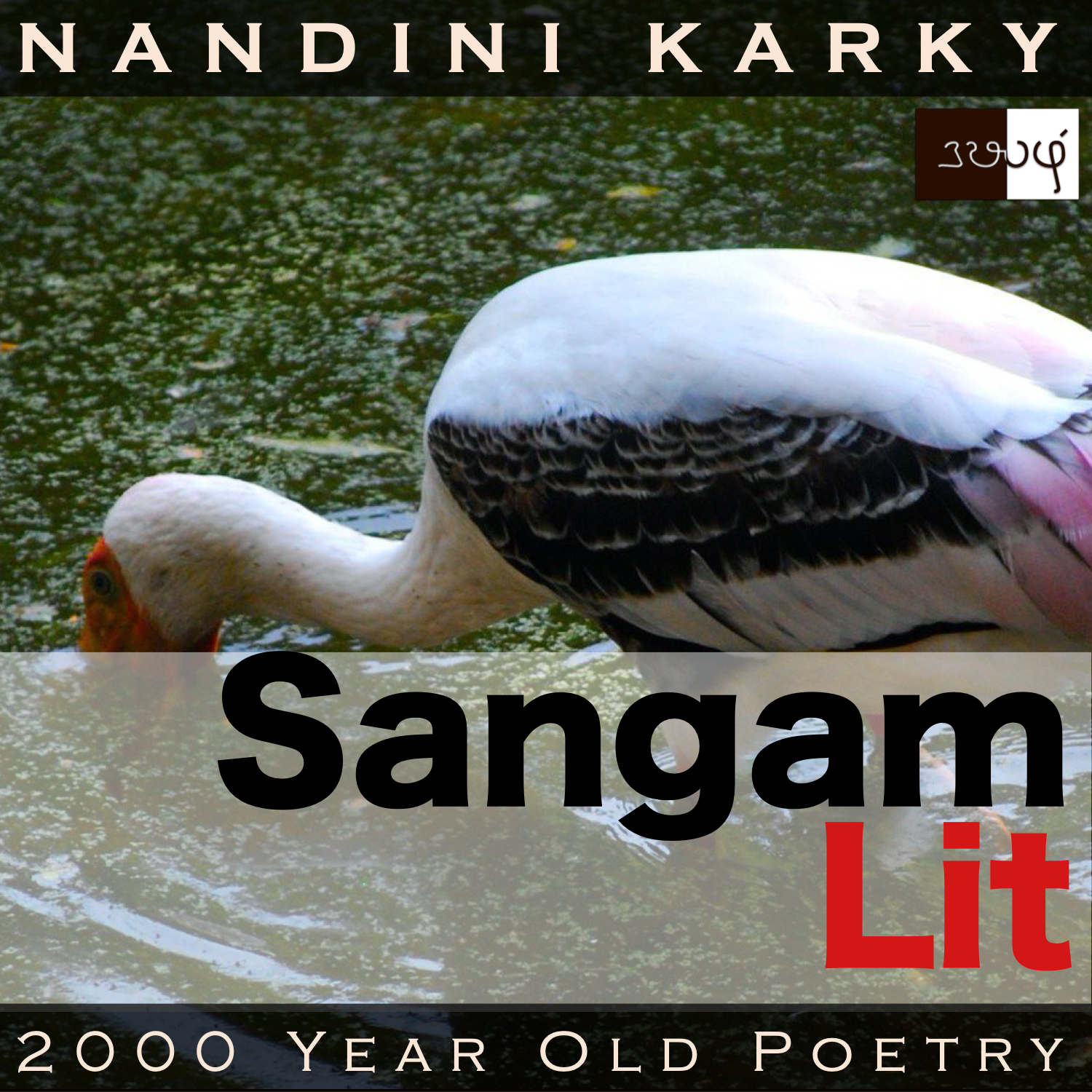Podcast: Play in new window | Download
Subscribe: Apple Podcasts | Spotify | Amazon Music | Android | iHeartRadio | TuneIn | RSS | More

In this episode, we take a walk on an ancient shore and perceive the story of longing and love in store, as depicted in Sangam Literary work, Natrinai 272, penned by Mukkal Aasaan Nalvellaiyaar. Set in the coastal landscape of ‘Neythal’, the verse speaks in the voice of the lady to her confidante, passing on a hidden message to the man, listening nearby.
கடல்அம் காக்கைச் செவ் வாய்ச் சேவல்,
படிவ மகளிர் கொடி கொய்து அழித்த
பொம்மல் அடும்பின் வெண் மணல் ஒரு சிறை,
கடுஞ் சூல் வதிந்த காமர் பேடைக்கு,
இருஞ் சேற்று அயிரை தேரிய, தெண் கழிப்
பூஉடைக் குட்டம் துழவும் துறைவன்
நல்காமையின், நசை பழுதாக,
பெருங் கையற்ற என் சிறுமை, பலர் வாய்
அம்பல் மூதூர் அலர்ந்து,
நோய் ஆகின்று; அது நோயினும் பெரிதே.
The verse begins with ‘கடல்அம் காக்கை’ and it could refer to any ‘sea bird’ that frequented the Tamil coast then. Our only clue lies in the ‘செவ் வாய்ச் சேவல்’ meaning ‘red-beaked male’ and even of that, there are many, such as oyster catchers, red-billed gulls, why even the exotic red-beaked Inca tern birds! Anyway, what’s in a name? As many an ornithologist would advise, observe its behaviour! Thereafter, we glimpse at ‘பொம்மல் அடும்பு’, ‘the leaf-filled beach morning glory vines’ that we have encountered in Natrinai 254 and 145, referred for its flower, much favoured by maiden on the shore. The phrase ‘கடுஞ் சூல் வதிந்த காமர் பேடைக்கு’ talks about ‘the pregnancy cravings of a loveable female bird’, a theme echoed in Natrinai verses 263 and 31. Adding to this collection of plant and animal life, appears the ‘இருஞ் சேற்று அயிரை’ or ‘the loaches in black mud’. ‘பெருங் கையற்ற என் சிறுமை’ talks about the lady’s ‘immense helplessness that causes thinning in her’. Adding to the distress of the lady, is the ‘அம்பல் மூதூர் அலர்’ meaning ‘the slanderous, old town gossip’. The verse ends with ‘அது நோயினும் பெரிதே’ meaning ‘it’s greater than that disease’. What disease is the lady talking about? Let’s find out!
The man and lady had been leading a love relationship and the man seemed intent only on trysting with the lady. One day, seeing the man arrive by her house, the lady turns to her confidante and says, “On one side of the white sands, where women performing rituals have plucked and cleared the luxuriant ‘adumbu’ vines, rests a desirable female seabird, filled with pregnancy cravings. To feed this mate, the red-beaked male hunts for loaches by digging in the dark mud and searching within the flower-filled marsh in the clear backwaters. Such is the shore of our lord! As he has not granted his grace to me, my love wastes away. Seeing the signs of my helpless pining, the slanderous, old town resounds with gossip, causing me to be afflicted further. This affliction is greater than the love affliction in me!” With these words, the lady is conveying the angst in her heart to the listening man and is subtly persuading him to seek her hand in marriage.
Now, for the nuances! The lady starts the conversation by bringing before our eyes, a red-beaked male sea bird. Before she goes on to talk about what this seabird is upto, the lady points in the direction of white sand dunes, where there seems to be a clearing of ‘adumbu’ vines. Not just the flowers but vines entire have been cleared in that patch on the shore. The lady clarifies this has happened in the hands of women performing rituals. Could the lady be referring to female ascetics of ancient times? It was true that some Sangam women chose to be monks and led a life of learning and wisdom then. Returning to the verse, in that patch of land, cleared by those women, there rests a female bird, the mate of the red-beaked bird we saw before. Why isn’t it on the hunt with its mate? Turns out, it is pregnant and unable to hunt for itself. Now, the lady focuses on the male’s actions. This bird seems to be digging deep into the dark slush and searching between fallen flowers on the waters for ‘ayirai’ fish! Not to fill its tummy, but to feed its loveable, little mate. The lady elaborates on this scene as if to describe the man’s land but, akin to that red-beaked seabird, we know to dig up the metaphors hiding within the words indeed!
Before we get to the metaphor, let’s listen to the rest of the lady’s words. She says that as the man does not grace her with his presence, her arms are thinning away in her helpless state of pining. Seeing the changes in her, the gossiping town spreads rumours many, which adds to her suffering, in a vicious cycle. The lady concludes that this disease of pining seems to afflict her more than the disease of love. Curious how the ancients envisioned love as a disease! The initial symptoms of love as in feverishness, sleeplessness and obsession would indeed match the description of a disease. But, in a world in the throes of a deadly disease today, love seems not a disease but a cure! Well, that’s a story for another time. Returning to the verse, by talking about the male sea-bird hunting and bringing food to its pregnant mate, the lady is persuading the man to bring precious offerings to her kith and kin and take her away to lead a happy, married life! So much in a lady’s life seems to rest on a man’s will to act. Could that have made women then to give up a life of marriage and seek to be a monk? Questions to keep alive in our explorations!




????????????????